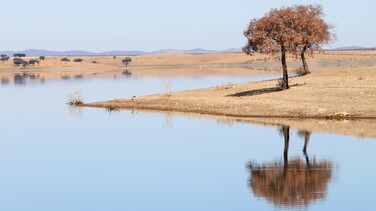Environment, Climate Change and Low Carbon Economy

Project promoter: Portuguese Environment Agency (APA)
Partners:
- Banco de Portugal (BP)
- Directorate General for the Territory (DGT)
- Faculty of Sciences of the University of Lisbon (FCUL)
- Portuguese Institute for Sea and Atmosphere (IPMA)
- Norwegian Directorate for Civil Protection (DSB)
The National Roadmap for Adaptation 2100 project - Portuguese Territorial Climate Change Vulnerability Assessment for XXI Century (RNA 2100) defines narratives of the evolution of vulnerabilities and impacts of climate change, as well as the assessment of the need for investment for adaptation and socio-economic costs of inaction.

The RNA 2100 thus supports and responds to public policy initiatives on adaptation to climate change at the various levels of territorial intervention, being also supported by initiatives to disseminate results, including to the general public, with the ambition of becoming an important enhancer for education and awareness on the issue of adaptation to climate change.
The RNA 2100 project brings together knowledge from diverse institutions, in order to ensure that all relevant areas are considered, namely the Portuguese Environment Agency (APA) as project promoter, Banco de Portugal (BP); the Directorate General for the Territory (DGT); the Faculty of Sciences of the University of Lisbon (FCUL); the Portuguese Institute for Sea and Atmosphere (IPMA) and the Norwegian Directorate for Civil Protection (DSB).
This is a Predefined Project (PDP) of the EEA Grants, which will provide €400,000 out of a total of €1,300,000. Consequently, the financing rate for EEA Grants is 30.77%, the remaining amount will be provided by APA.
The project started in September 2020 and is expected to be completed in December 2023.

The identification of climate vulnerabilities at the national level was carried out in the context of the project "Climate Change in Portugal: Scenarios, Impacts and Adaptation Measures" (SIAM), developed in two phases, completed, respectively, in 2002 and 2006 (project conclusions available at: http://cciam.fc.ul.pt/prj/siam), that is, for more than 10 years. Therefore, it is essential to carry out the assessment of climate vulnerabilities at a national and regional scale (which are extreme events, such as heat waves, precipitation and extreme winds), in order to ensure the socio-ecological resilience of territories at different levels of planning and management. With the preparation of the Action Program for Adaptation to Climate Change (P-3AC), approved by Council of Ministers Resolution No. 130/2019, it was possible to identify the main impacts and vulnerabilities of the territory, namely:

It is therefore important to systematize and update existing knowledge on climate vulnerabilities and its integration in the various territory-related exercises, as well as to define methodologies and criteria for future integration of vulnerabilities and impacts in future exercises.
An important component needed is related to the social and economic impacts of climate change in the national territory, which are not sufficiently studied and which require the development of appropriate methodologies.
The assessment of vulnerabilities will be carried out by:
- Analysis of historical climate projections and evaluation of their accuracy by comparing them with the observed climate (Reference period: 1971-2000);
- Compilation of all results of regional CORDEX (EURO and MED) climate simulations for present and future climate, and definition of the set for each of the scenarios of future GHG concentration (RCP2.6, RCP4.5 and RCP8.5);
- Calculation of sectoral climate indices;
- Characterization of uncertainty associated to the climate change signals;
- Compilation of EURO-CORDEX results forcing the global climate model (GCMs) into the present and future;
- Development of global and regional models for the following periods: 2041-2070 and 2071-2100 and for the following concentration scenarios: RCP2.6, RCP4.5 and RCP8.5.
In view of the above, the following actions will be supported:
- The activities of the National Adaptation Strategy (ENAAC 2020), the implementation and monitoring of the Action Program for Adaptation to Climate Change (P-3AC), as well as other strategic instruments and plans on adaptation to climate change of subnational and/or sectoral scope, namely supporting the implementation of the National Spatial Planning Policy Program (PNPOT), identifying and mapping the territories vulnerable to climate change, with particular emphasis on extreme events, at national and regional scale, in order to guarantee the socio-ecological resilience of territories at different levels of planning and management in the context of the Territorial Challenge;
- The progressive integration of adaptation to climate change in the design of projects of direct and indirect intervention in the territory;
- Determining the financial needs that should be taken into account in future financial programming exercises.
PRODUCTS:
Reports:
WP1. Stakeholder engagement
- WP1A - Stakeholder Engagement
- WP1B 1 - Emergency Preparedness Analysis Forest Fire
- WP1B 2 - Risk analysis at a societal level
WP2. Climate projections and indexes
- WP2A - Climate Projections, Extremes, and Indices - Mainland Portugal
- WP2A - Climate Projections, Extremes, and Indices - Supplementary Material
- WP2E - Climate Projections, Extremes, and Indices - Portugal Autonomous Regions
WP3. Socioeconomic scenarios
WP4. Sectoral impacts modelling
- WP4C1 Sectoral Impacts Modelling - Executive Summaries
- WP4C2 Sectoral impacts modelling - Hydrological Balance & Agroforestry
- WP4C3 Sectoral Impacts Modelling - Droughts
- WP4C4 Sectoral Impacts Modelling - Forest fires
- WP4C5 Sectoral Impacts Modelling - Coastal areas: from sea level rise to coastal erosion
WP5. Measures and Costs of Adaptation
WP6. Macroeconomic impacts
WP7. Development of the adaptation storylines
- WP7A1 - Development of Adaptation Storylines
- WP7B - Review of guidelines on adaptation to climate change in spatial plans and programmes
- WP7C 1 - Summary Card for Water resources and agroforestry
- WP7C 2 - Summary Card for Forest Fires
- WP7C 3 - Summary Card for Coastal Areas
WP8. Communication and capacitation
Published papers:
WP2. Climate projections and indexes
WP2B 1- Cardoso, R. M., Lima, D. C., & Soares, P. M. (2023). How persistent and hazardous will extreme temperature events become in a warming Portugal? Weather and Climate Extremes, 41, 100600. DOI: https://doi.org/10.1016/j.wace.2023.100600
WP2B 2 - Lima, D. C., Lemos, G., Bento, V. A., Nogueira, M., & Soares, P. M. (2023). A multi-variable constrained ensemble of regional climate projections under multi-scenarios for Portugal – Part I: An overview of impacts on means and extremes. Climate Services, 30, 100351. DOI: https://doi.org/10.1016/j.cliser.2023.100351
WP2B 3 - Lima, D. C., Bento, V. A., Lemos, G., Nogueira, M., & Soares, P. M. (2023). A multi-variable constrained ensemble of regional climate projections under multi-scenarios for Portugal – Part II: Sectoral climate indices. Climate Services, 30, 100377. DOI: https://doi.org/10.1016/j.cliser.2023.100377
WP2B 4 - Soares, P. M., Lemos, G., & Lima, D. C. (2022). Critical analysis of CMIPs past climate model projections in a regional context: The Iberian climate. International Journal of Climatology, 43(5), 2250-2270. DOI: https://doi.org/10.1002/joc.7973
WP2B 5 - Soares, P. M., & Lima, D. C. (2022). Water scarcity down to earth surface in a Mediterranean climate: The extreme future of soil moisture in Portugal. Journal of Hydrology, 615, Part B, 128731. DOI: https://doi.org/10.1016/j.jhydrol.2022.128731
WP3. Socioeconomic scenarios
WP3A 2 - Pedersen, J. T. S., van Vuuren, D., Gupta, J., Santos, F. D., Edmonds, J., & Swart, R. (2022). IPCC emission scenarios: How did critiques affect their quality and relevance 1990–2022? Global Environmental Change, 75, 102538. DOI: https://doi.org/10.1016/j.gloenvcha.2022.102538
WP3A 3 - Pedersen, J. S. T., Dias, L. F., Kok, K., van Vuuren, D., Soares, P. M., Santos, F. D., & Azevedo, J. C. (2024). Increased policy ambition is needed to avoid the effects of climate change and reach carbon removal targets in Portugal. Regional Environmental Change, 24(2), 1-17. DOI: https://doi.org/10.1007/s10113-024-02217-4
WP3A 4 - Pedersen J, Gomes C, Gupta J, Vuuren D, Santos FD, O’Rourke P, Swart R (2023) Policy-relevance of emission scenarios: Policymakers require simpler communicated scenarios, including national detail and actions. Under review. DOI: http://dx.doi.org/10.2139/ssrn.4073175
WP4. Sectoral impacts modelling
WP4A 1 - Soares, P. M., Careto, J. A., Russo, A., & Lima, D. C. (2023). The future of Iberian droughts: a deeper analysis based on multi-scenario and a multi-model ensemble approach. Natural Hazards, 117(2), 2001-2028. DOI: https://doi.org/10.1007/s11069-023-05938-7
WP4A 2 - Bento, V. A., Russo, A., Vieira, I., & Gouveia, C. M. (2023). Identification of forest vulnerability to droughts in the Iberian Peninsula. Theoretical and Applied Climatology, 152(1), 559-579. DOI: https://doi.org/10.1007/s00704-023-04427-y (WP4 & WP5)
WP4A 3 - Santos, L. C., Lima, M. M., Bento, V. A., Nunes, S. A., DaCamara, C. C., Russo, A., Soares, P. M. & Trigo, R. M. (2023). An Evaluation of the Atmospheric Instability Effect on Wildfire Danger Using ERA5 over the Iberian Peninsula. Fire, 6(3), 120. DOI: https://doi.org/10.3390/fire6030120
WP4A 4 - Bento, V. A., Lima, D. C., Santos, L. C., Lima, M. M., Russo, A., Nunes, S. A., ... & Soares, P. M. (2023). The future of extreme meteorological fire danger under climate change scenarios for Iberia. Weather and Climate Extremes, 42, 100623. DOI: https://doi.org/10.1016/j.wace.2023.100623
WP4A 5 - van der Laan, E., Nunes, J. P., Dias, L. F., Carvalho, S., & Dos Santos, F. M. (2023). Assessing the climate change adaptability of sustainable land management practices regarding water availability and quality: A case study in the Sorraia catchment, Portugal. Science of the Total Environment, 897, 165438. DOI: https://doi.org/10.1016/j.scitotenv.2023.165438 (WP4 & WP5)
WP4A 6 - Lemos, G., Bosnic, I., Antunes, C., Vousdoukas, M., Mentaschi, L., Soares, P. M. M. (2024a). The future of the Portuguese (SW Europe) most vulnerable coastal areas under climate change – Part I: performance evaluation and shoreline evolution from a downscaled bias corrected wave climate ensemble. Ocean Engineering, 117661. DOI: https://doi.org/10.1016/j.oceaneng.2024.117661
WP4A 7 - Lemos, G., Bosnic, I., Antunes, C., Vousdoukas, M., Mentaschi, L., Espírito Santo, M., Ferreira, V., Soares, P. M. M. (2024b). The future of the Portuguese (SW Europe) most vulnerable coastal areas under climate change – Part II: future extreme coastal flooding from downscaled bias corrected wave climate projections (2024). Ocean Engineering, 118448. DOI: https://doi.org/10.1016/j.oceaneng.2024.118448
WP5. Measures and Costs of Adaptation
WP5B 1 - DaCamara, C.C., Bento, V.A. Nunes, S.A., Lemos, G., Soares, P.M.M., Trigo, R.M. (2024). Impacts of fire prevention strategies in a changing climate: an assessment for Portugal. Environmental Research: Climate, 3 045002. DOI: https://doi.org/10.1088/2752-5295/ad574f
WP6. Macroeconomic impacts
WP6A 2 - Antunes, António R., Adão, Bernardino, Valle e Azevedo, João, Lourenço, Nuno and Gouveia, Miguel, (2022), Alterações climáticas e economia: uma introdução, Working Papers, Banco de Portugal, Economics and Research Department. https://EconPapers.repec.org/RePEc:ptu:wpaper:o202201
WP7. Development of the adaptation storylines
WP7A 2 - Araújo, J. R., Ramos, A. M., Soares, P. M., Melo, R., Oliveira, S. C., & Trigo, R. M. (2022). Impact of extreme rainfall events on landslide activity in Portugal under climate change scenarios. Landslides, 19(10), 2279-2293. DOI: https://doi.org/10.1007/s10346-022-01895-7
WP7A 3 - Ramos, A. M., Russo, A., DaCamara, C. C., Nunes, S., Sousa, P., Soares, P. M. M., ... & Trigo, R. M. (2022). The compound event that triggered the destructive fires of October 2017 in Portugal. IScience, 26(3). DOI: https://doi.org/10.1016/j.isci.2023.106141
WP7A 4 - Fernández-Nóvoa, D., González-Cao, J., Figueira, J. R., Catita, C., García-Feal, O., Gómez-Gesteira, M., & Trigo, R. M. (2023). Numerical simulation of the deadliest flood event of Portugal: Unravelling the causes of the disaster. Science of the total environment, 896, 165092. DOI: https://doi.org/10.1016/j.scitotenv.2023.165092
WP7A 5 - Fernández-Nóvoa D., Ramos A. M., González-Cao J., García-Feal O., Catita C., Gómez-Gesteira M., Trigo M. R. (2022) How to mitigate flood events similar tothe 1979 catastrophic floods in lower Tagus. Natural Hazards and Earth System Sciences. DOI: https://doi.org/10.5194/nhess-2022-243
